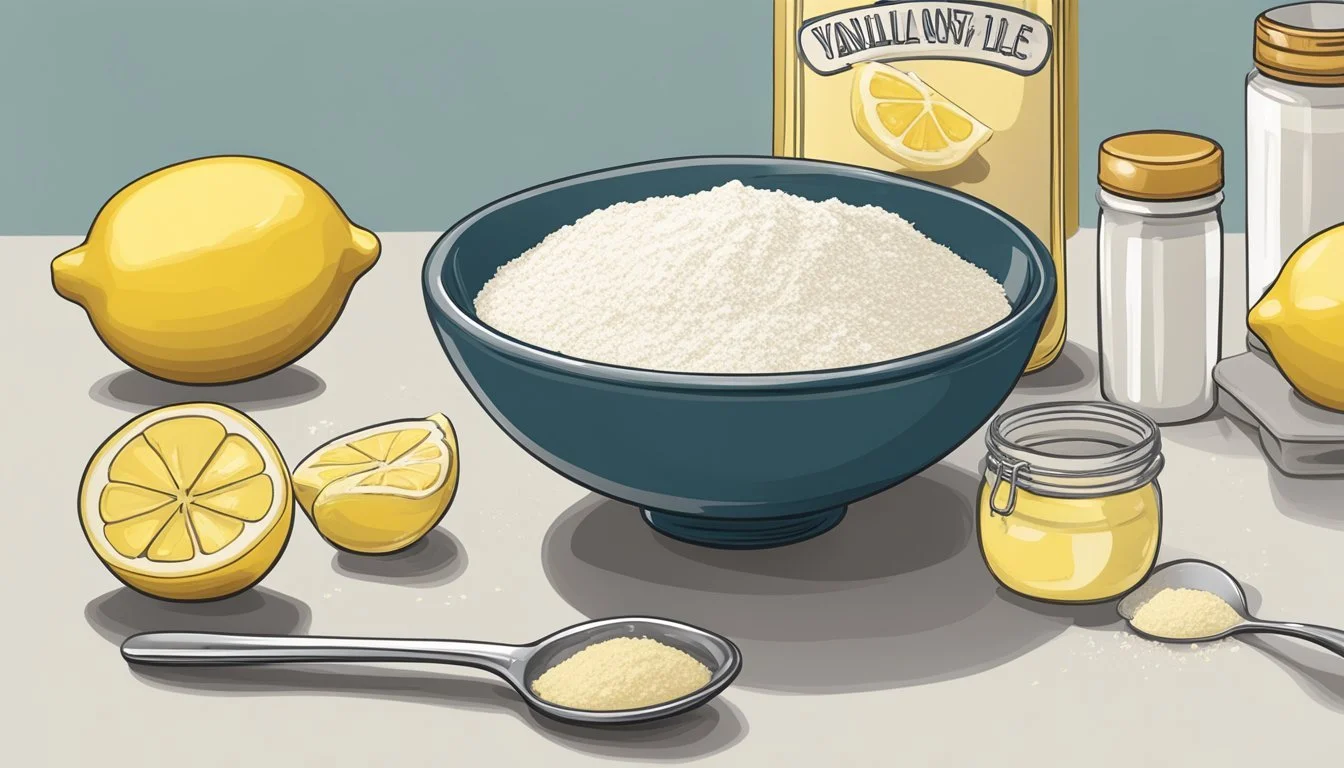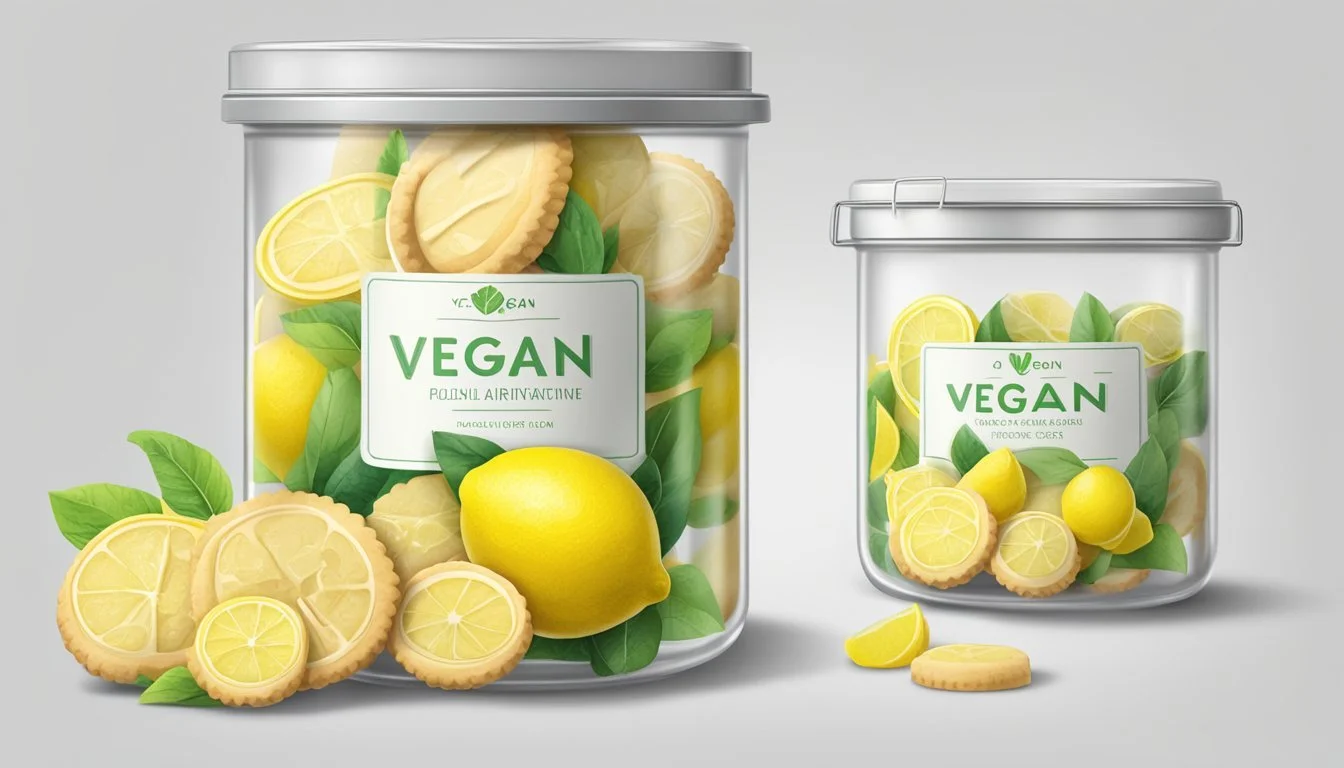Are Lemon Cookies Vegan?
Unveiling the Ingredients and Variations
Lemon cookies epitomize the perfect blend of tangy and sweet, making them a popular dessert choice. Their zesty flavor, derived from the citrusy essence of lemon, brings a refreshing twist to the traditional cookie. However, whether lemon cookies are vegan or not depends on the ingredients used in their preparation.
Traditional cookie recipes often include dairy products and eggs, which are not considered vegan. On the other hand, vegan lemon cookies are crafted with plant-based substitutes that align with vegan dietary guidelines. These vegan versions might incorporate ingredients like almond flour or rice flour, along with vegan butter or cooking oils, and natural sweeteners to achieve the desired taste and texture without the use of animal products.
The vegan community enjoys a variety of lemon cookie recipes that cater to their dietary preferences. These recipes have evolved to not only exclude animal-derived ingredients but also to provide a flavorful experience that rivals their non-vegan counterparts. Whether for ethical, environmental, or health reasons, vegan lemon cookies are a testament to the versatility and adaptability of plant-based baking.
Understanding Veganism
Veganism is a dietary and lifestyle choice where individuals abstain from using animal products and by-products. Adherence to this lifestyle extends beyond food choices to include rejection of animal-derived materials, such as leather and wool, and products tested on animals.
Primary Components of a Vegan Diet:
Plant-based foods: Includes fruits, vegetables, legumes, grains, nuts, and seeds.
Dairy alternatives: Such as soy, almond, oat, and coconut milk.
Meat replacements: Often made from soy, seitan, (What wine goes well with seitan?) or jackfruit.
When it comes to baking, traditional recipes often call for non-vegan ingredients like eggs, butter, and milk. Vegan lemon cookies, therefore, substitute these with plant-based alternatives. They maintain the characteristic zesty flavor and sweetness without using animal-derived products.
Example Substitutes in Vegan Lemon Cookies:
Vegan butter or oils instead of traditional butter.
Plant-based milks, and in some cases, lemon juice itself adds moisture.
Flax eggs (ground flax seeds mixed with water) or other binding agents are used rather than chicken eggs.
Ensuring that lemon cookies are vegan requires careful scrutiny of each ingredient. For instance, sugar is a common ingredient in cookies but might not be vegan due to the bone char often used in its processing. Unrefined or organic sugar, however, is typically considered vegan.
Ultimately, vegan lemon cookies are a testament to the versatility of vegan baking, showcasing how traditional sweets can be enjoyed within the boundaries of veganism, thanks to a wide array of plant-based substitutes.
Lemon Cookie Ingredients
Creating delicious vegan lemon cookies involves selecting the right ingredients to achieve the characteristic citrus flavor while adhering to vegan dietary restrictions. Each component plays a crucial role in the texture and taste of the final cookie.
Lemon Components
In vegan lemon cookies, lemon zest and lemon juice are essential for imparting a fresh lemon flavor. These ingredients provide the authentic citrus taste without the need for non-vegan additives.
Lemon zest: Provides intense lemon flavor.
Lemon juice: Adds tartness and can contribute to the chemical reaction with leavening agents.
Sweeteners
Vegan sweeteners replace traditional white sugar, which may be processed with animal bone char.
Granulated sugar: ½ cup or to taste, ensure it's certified vegan.
Powdered sugar: Used for sweetening and creating a desirable cookie texture.
Coconut sugar: Offers a caramel-like taste and is a less processed option.
Maple syrup: Can be used for natural sweetness and moistness.
Binders and Flours
Binders and flours provide structure and can be chosen based on desired dietary needs such as gluten-free options.
All-purpose flour: Classic choice for baking, use gluten-free if necessary.
Almond flour: Adds nuttiness and helps with binding in gluten-free recipes.
Oat flour: Provides whole grain nutrition and is naturally gluten-free.
Tapioca starch: Often combined with other flours to improve the texture of gluten-free cookies.
Fats and Oils
Fats add richness and help to achieve a desirable mouthfeel. They also play a crucial role in keeping the cookies tender.
Vegan butter: Offers a buttery flavor without using dairy.
Coconut oil: Provides moisture and can contribute to a slightly coconutty undertone.
Flavor Enhancers and Extras
Additional flavorings enhance the lemon taste and overall complexity of the cookies.
Vanilla extract: Rounds out the sweetness and complements the lemon flavor.
Lemon extract: Heightens the lemon profile, use sparingly.
Sea salt: Balances the sweetness and brings out the lemon flavor.
Leavening Agents
Leavening agents ensure that the cookies rise properly and have a light texture.
Baking powder: Commonly used for rise and lightness.
Baking soda: Reacts with acidic components like lemon juice for leavening.
Vegan Baking Basics
Vegan baking replaces animal-derived ingredients with plant-based alternatives to create delicious treats such as lemon cookies that are both dairy and egg-free. The key to mastering vegan baking lies in understanding ingredient substitutes and technique adjustments, ensuring delightful results that cater to dietary preferences without compromising on taste and texture.
The Role of Substitutes
In vegan baking, traditional ingredients like butter and eggs are replaced with vegan alternatives. Vegan butter is used to replicate the creamy texture of dairy butter. For eggs, one could use flaxseed or chia seed mixtures which bind the batter like eggs but are completely plant-based. Lemon juice can contribute to the tart, lemony flavor in vegan lemon cookies.
Eggs: Flax or chia seeds + water
Butter: Vegan butter variants
Technique Adjustments
Technique adjustments in vegan baking focus on mimicking the properties of non-vegan ingredients. Over-mixing batter may hinder the soft texture of cookies, and using a mixer at the correct speed is crucial in incorporating air into vegan butter and sugar. One must preheat the oven to the right temperature for even baking and ensure cookies cool on a rack to maintain a chewy texture.
Mixing: Gentle to avoid over-mixing
Baking: Accurate oven preheating
Cooling: Employ cooling racks
Gluten-Free Options
For those seeking gluten-free vegan lemon cookies, various blends can be utilized. Brown rice flour, tapioca flour, and almond flour often combine for a gluten-free flour mix that results in a soft, chewy cookie. It's important to find the right blend to avoid a gritty or crumbly texture.
Flours: Brown rice, tapioca, and almond flour
Texture and Consistency
Achieving the desired soft and chewy texture in vegan cookies involves careful selection of ingredients and baking time. The consistency of the batter should be slightly tacky but not overly wet or dry; balancing dry and wet ingredients is essential. Vegan cookies may require less bake time than traditional versions.
Batter Consistency: Slightly tacky, not too dry or wet
Baking Time: Possibly shorter than non-vegan cookies
Common Vegan Baking Challenges
Common challenges in vegan baking include ensuring sweetness without the use of animal-derived products and managing the cookie's spread on the baking sheet. Sugar types or alternatives dictate the level of sweetness, and the temperature of ingredients like vegan butter affects how much cookies will spread during baking.
Sweetness: Appropriate sugar types or alternatives
Spread: Temperature of ingredients like vegan butter
Step-By-Step Vegan Lemon Cookie Recipe
Creating delicious vegan lemon cookies is straightforward and involves making the cookie dough, baking, applying a lemon glaze, and adding decorative touches. This recipe will yield light, citrusy cookies with a sweet glaze that are perfect for any occasion.
Preparing the Cookie Dough
The success of the vegan lemon cookies lies in the careful preparation of the cookie dough. Combine 1 cup of flour, ⅓ cup almond flour, 1 teaspoon baking powder, and ¼ teaspoon baking soda in one bowl for the dry ingredients. In a separate bowl, thoroughly mix melted vegan butter, sugar, lemon zest, 2 tablespoons lemon juice, and 1 teaspoon vanilla extract to form the wet mixture.
Preheat oven to 350°F (177°C).
Mix the dry ingredients until evenly distributed.
Gradually incorporate the wet ingredients into the dry, mixing until a consistent dough forms.
Chill the dough for 30 minutes to firm up, making it easier to handle.
Baking the Cookies
Once the dough is prepared, it's time to bake the cookies:
Line a baking sheet with parchment paper.
Roll the dough into 1-inch balls and place them on the baking sheet, ensuring that they have enough room to expand.
Press the balls down slightly with the back of a spoon or a piece of parchment paper if a flatter cookie is desired.
Cook time: 10 minutes or until the edges are golden.
Applying Lemon Glaze
The lemon glaze adds a layer of sweet and tangy flavor to the cookies. To make the glaze:
Whisk together ½ cup powdered sugar with ¼ cup lemon juice until smooth.
Brush or drizzle the glaze over the cookies while they are still warm.
Allow the glaze to set for a few minutes before serving.
Decorating and Presentation
For a more appealing presentation:
Sprinkle a bit of lemon zest over the glazed cookies for an extra pop of color and flavor.
Arrange the cookies on a serving platter or cookie jar.
Serve the cookies at room temperature to ensure the glaze has set and the flavors have melded.
This recipe, with a prep time of 10 minutes and a cook time of 10 minutes, will produce delightful vegan lemon cookies that are sure to impress.
Storage and Preservation
Storing and preserving vegan lemon cookies effectively ensures they maintain their taste and texture for future enjoyment. For maximum freshness, cookies should be kept in an airtight container. This limits exposure to air and moisture, which can cause the cookies to become stale or soggy.
When storing the cookies at room temperature, ensure they are kept in a cool, dry place away from direct sunlight. They typically remain fresh for up to 5 days when stored properly. For those preferring a crispier cookie, they might choose to slightly reduce the storage time.
In the event that a longer storage solution is needed, freezing the cookies is an option. To freeze the cookies:
Wait until the cookies have completely cooled after baking.
Place the cookies in a single layer on a baking sheet, ensuring they're not touching.
Freeze them on the sheet for 1-2 hours or until solid.
Once the cookies are frozen, transfer them to an airtight container or a secure freezer bag, separating layers with parchment paper to prevent sticking. They can be stored in the freezer for up to 2 months. To defrost, simply remove the desired amount of cookies from the freezer and allow them to thaw at room temperature in their container.
To maintain the cookies' form during both storage and freezing, it's recommended to use a cookie scoop when initially shaping the dough. This provides uniformity, aiding in even baking and consistent results during storage.
Nutrition and Health Considerations
When assessing the nutritional profile of lemon cookies, particularly vegan varieties, it is crucial to consider the ingredients used. Vegan lemon cookies forego traditional animal-derived products such as eggs and butter, instead opting for plant-based alternatives like almond flour, soy milk, and almond butter. These substitutions can contribute to a more favorable fatty acid profile, incorporating unsaturated fats that are beneficial for heart health.
Key Nutrient Components:
Carbohydrates: Primarily from flours and sugars, providing energy.
Proteins: Present in smaller amounts, sourced from almond flour and soy milk.
Fats: Healthy fats from almond butter and vegan butters usually comprise the fat content.
Fiber: Almond flour contributes dietary fiber, which aids in digestion.
Vitamins: Lemon zest offers vitamin C and flavonoids, which have antioxidant properties.
Caloric Content: A standard vegan lemon cookie will typically contain a similar calorie count to its non-vegan counterpart, due to the sugar and flour. However, the quality of the calories may be improved by the inclusion of whole food ingredients that offer additional micronutrients and fiber.
It is important to note that while vegan lemon cookies can be a part of a balanced diet, they should still be consumed in moderation. The use of sugars, whether organic or refined, contributes to the overall caloric intake and can impact blood sugar levels. Consumers looking for a healthier alternative should look for recipes that reduce added sugars or use natural sweeteners.
In summary, vegan lemon cookies can offer certain nutritional advantages when compared to traditional recipes. They harness the benefits of plant-based ingredients, which can contribute positively to one’s health when included as part of a diverse and balanced diet.
Serving Suggestions and Variations
These vegan lemon cookies can be elegantly served alongside an array of desserts and adapted for various events. Whether one is aiming to satisfy a lemon lover’s craving or looking for a fitting cookie variety, this section explores a myriad of ways to enjoy and modify the classic lemon cookie recipe.
Lemon Themed Desserts
Lemon is a versatile flavor that pairs well with an assortment of treats. For a cohesive dessert table, consider accompanying the vegan lemon cookies with a lemon drizzle cake or a zesty lemon shortbread. A lemon cake topped with a layer of frosting can also be an excellent centerpiece for a lemon-themed dessert spread.
Occasions and Events
Lemon cookies are a refreshing choice for a variety of gatherings. They are especially fitting for:
Spring Celebrations: Their bright, citrusy flavor matches the fresh vibrancy of the season.
Holidays: A twist on traditional flavors, such as Christmas, with lemon cookies adding a tangy note to holiday dessert tables.
Baby Showers: The cookies' soft pastel color can be a delightful addition to the sweets selection, suitable for both boys and girls.
Cookie Varieties
In addition to the simple lemon cookie, there are various ways to modify the recipe to create a plethora of cookie varieties:
Vegan Snickerdoodles: Add cinnamon to the dough, rolling the cookies in a mixture of cinnamon and sugar before baking.
Crinkle Cookies: Create texture by rolling the dough balls in powdered sugar just before baking.
Coconut Cookies: Incorporate desiccated coconut into the dough for an added tropical twist with the lemon flavor.
Using these suggestions, vegan lemon cookies can easily be tailored to any palate or occasion, ensuring a delicious and thoughtful addition to any dessert lineup.
Wrap-Up and Additional Tips
When embarking on the journey of baking vegan lemon cookies, the right techniques and tips can make the process smooth and successful. Bakers can enjoy the simplicity of creating this delightful treat, which often requires just one bowl, minimizing cleanup.
Using either a hand mixer or a stand mixer, ingredients can be efficiently combined. This is especially useful when creaming together vegan butter and sugars to achieve the optimal texture. Making sure to scrape down the sides of the bowl ensures even mixing.
For those seeking an easy-to-make treat, vegan lemon cookies are a commendable choice. With the total preparation and baking time typically not exceeding 20 minutes, they are both quick and easy to whip up. Below, you will find a concise list of additional tips to aid in the baking process:
Preparation: Save time by gathering all ingredients before starting.
Baking: Always preheat your oven for even baking.
Scooping: Use a cookie scoop for uniform cookies.
Storage:
Room Temperature: Store in an airtight container for freshness.
Freezing: Wrap well and freeze to extend shelf-life.
Following these pointers, chefs can confidently produce delectable vegan lemon cookies that are sure to please any palate. Whether one is a novice or an experienced baker, these tips enhance the baking experience and contribute to a delightful outcome.








